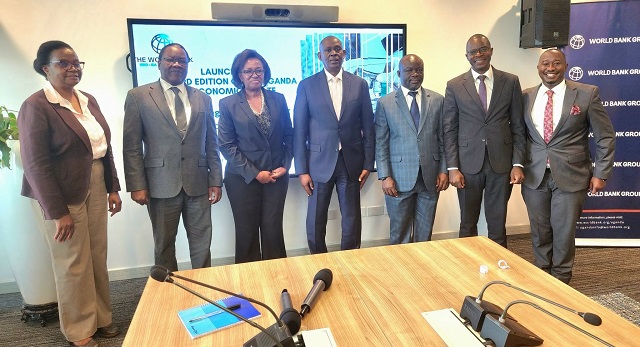
Kampala, Uganda | THE INDEPENDENT | The World Bank has given Uganda’s economy a positive midterm outlook but forecasts slower growth rates than the government projections.
According to the 23rd Edition of the Uganda Economic Update, the economy will grow by 6.2 percent next financial year and improve further to 6.6 percent in 2025/2026.
These growth rates are lower than the 7 percent Minister for Finance, Planning and Economic Development Matia Kasaija gave in his budget speech of between 6.4 and 7 percent for 2024/2025 and “double digits” in the subsequent years.
Both predictions have avoided including the expected full benefits of the oil and gas revenues expected to start flowing in in 2026, but the officials are aware that the heavy investments in the sector’s infrastructure will continue, boosting the growth.
However, the World Bank Country Manager for Uganda Mukami Kariuki says the sustainability of this good picture needs support and protection from risks.
“Uganda’s economy is growing and is resilient despite having experienced multiple successive shocks;, the medium-term outlook, even if a little fragile, looks positive,” she says.
These will include sustained adequate investments in human capital, especially health, education, and social welfare, and improved debt and oil revenue management, among others, according to Mukami.
The report hails Uganda’s progress on various fronts in the health care system, saying it is within the regional standards, even when compared to its relatively bigger peers.
The Minister of Finance, Planning, and Economic Development has provided 2.94 trillion shillings (4.1 percent of the total national budget) for health.
However, Mukami says more effort is needed in the form of promoting human capital, as, according to her, no country transforms without investment in its people.
According to the report, the Ugandan economy remains resilient amid intensifying climate shocks and a challenging global environment, with the oil and gas and minerals sector attracting significant investments.
Although agricultural production was affected by adverse weather, the report says, supply conditions improved, and moderating prices for food and essential goods supported the improvements in household welfare.
The economy was affected by the depreciation of the shilling mainly caused by the increased exit of foreign investors in financial instruments like stocks, bonds, and bills.
The outflow of investments was caused by monetary and fiscal policy changes in advanced economies.
Rachel Sebudde, Senior Economist at the World Bank, who presented the report, says the country must focus more on raising local resources to avoid being strained by high debt levels.
According to the government, Uganda’s debt has fallen back to about 48 percent of the GDP following the revised figures on the size of the economy and remains one of the lowest in the region.
Sebudde says that so far the government has instituted commendable measures in the form of the Domestic Revenue Mobilization Strategy, and digitization of revenue management, but that at just 14 percent of the GDP, the revenues are very low and expose the country to more debt.
She, however, calls on the government to focus on expanding the tax base and reducing the burden on the existing few taxpayers, but also plug existing revenue leaks.
On the good performance of the economy, Kenneth Mugambe, former Director of Budget turned financial consultant at Global Pearl Services, attributes the fortunes to the policies and reforms that were instituted by the Ministry years back and are now paying dividends.
He says that the high growth rates show that the country has moved beyond the effects of covid-19 which has seen growth fall to below 3 percent.
However, he urges the government and parliament on budget discipline, saying that even the fiscal consolidation strategy which is aimed at ensuring efficient budgetary allocations is not being affected as seen in the numerous supplementary budgets.
This, he says, may not allow the achievement of the projected growths.
The Ministry, is, however, sure that the growth rates will be attained. Joseph Enyimu, the Commissioner of Economic Development, Policy, and Research, says the current growth rates will be sustainable and transformational as more Ugandans are being empowered mainly through the grassroots wealth creation programs of the government, investments in tourism, and investor confidence, among others.
Enyimu says the country’s economic structure is changing, adding that the natural resources sector is almost still untouched, showing high potential.
Enyimu defends the higher government projections on growth relative to the World Bank’s forecast and vows that, unless the possible risks materialize, the rates will be achieved.
*****
URN
 The Independent Uganda: You get the Truth we Pay the Price
The Independent Uganda: You get the Truth we Pay the Price



